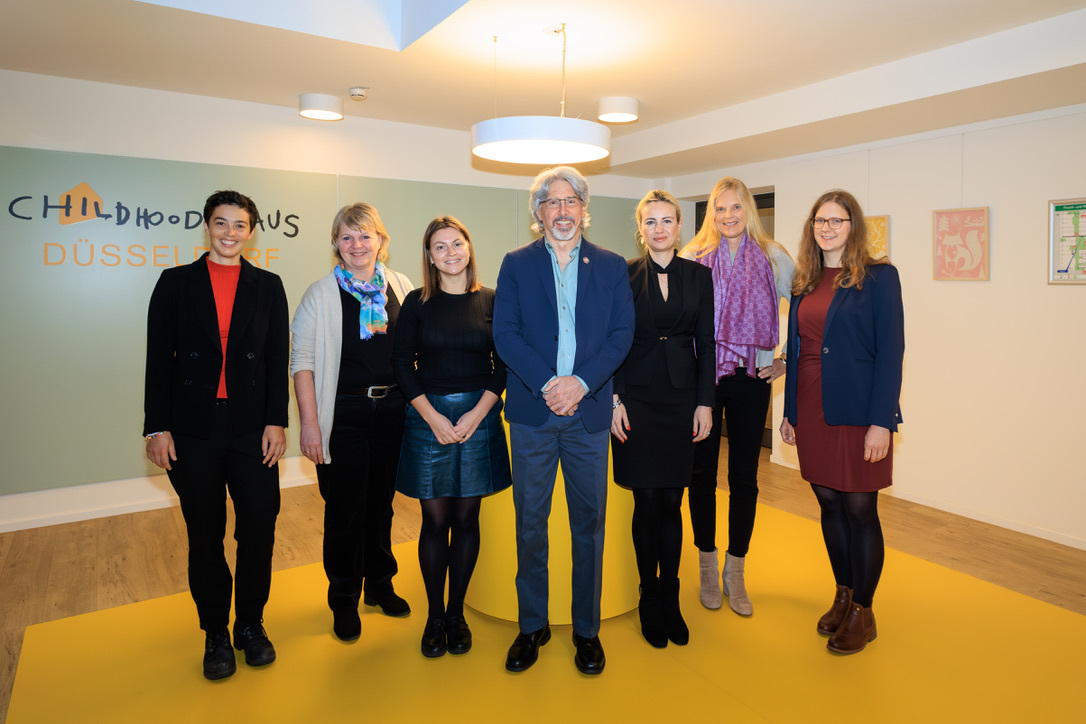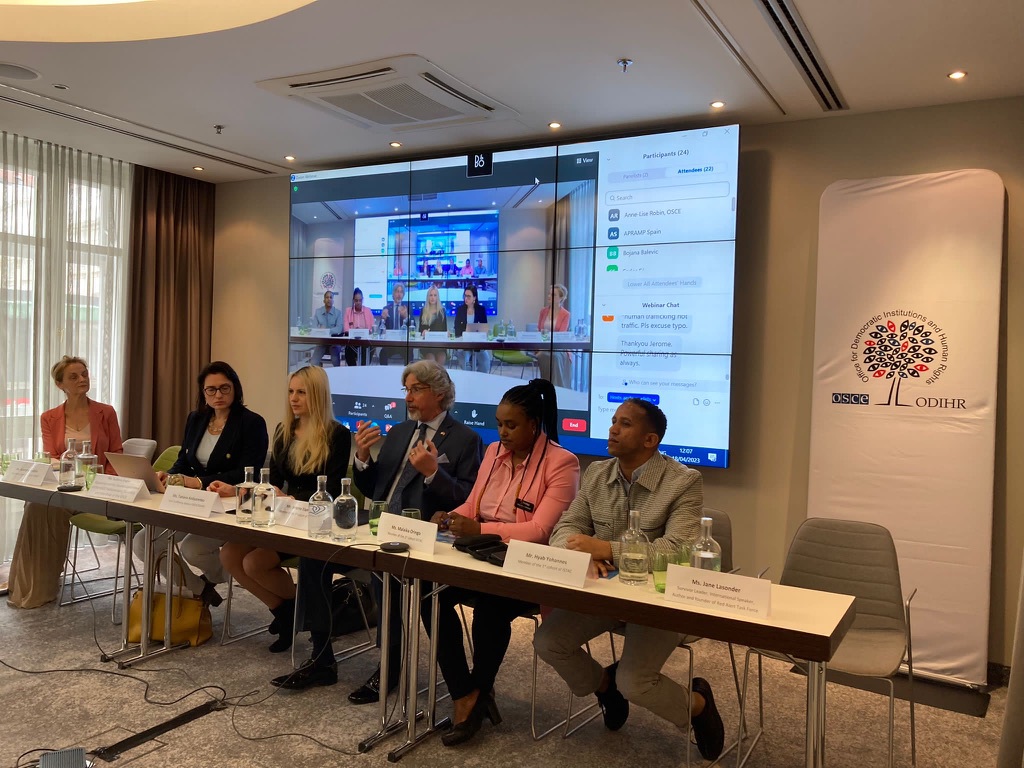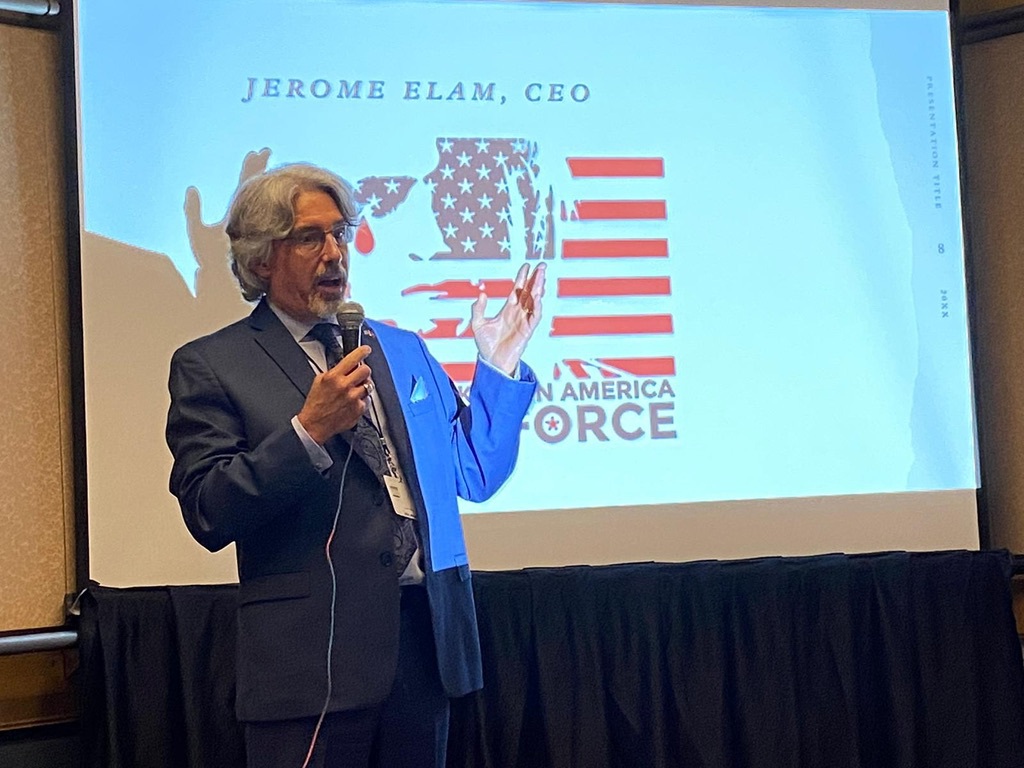Every hardship involves a story of heroism, and Jerome Elam‘s story exemplifies resilience and hope. As President and CEO of the Trafficking in America Task Force, Jerome has converted his traumatic experiences into a force for change, advocating for the rights of trafficking victims around the world.
In this exclusive DevelopmentAid Hero Stories interview, Jerome discusses his journey from exploitation to activism. His voice, once muted by the chains of torture, now rings out in the halls of power, arguing for policies that protect the innocent while prosecuting the guilty.
From his early days as a Marine Corps veteran to his prominent role in creating anti-trafficking measures, Jerome’s insights have become a beacon of light for others who remain in the dark. His tireless commitment to education, legislation, and assistance for survivors has not only changed people’s lives but also reshaped the fight against human trafficking.
DevelopmentAid: Your individual experiences of child abuse, domestic violence, child sex trafficking, and child pornography have undoubtedly shaped your advocacy work. Could you share with us how these experiences have influenced your mission with the Trafficking in America Task Force?
Jerome Elam: My individual experiences of child abuse, domestic violence, child sex trafficking, and child pornography have fueled my passion to save others from the pain I endured as a child. My background as a Marine Corps veteran has connected me with veterans worldwide, many of whom have shared their struggles with childhood trauma and combat memories. Listening to their stories has reinforced my commitment to this cause.
The plight of many children, who long for love but are met with exploitation, resonates deeply with me. My own yearning for affection left me vulnerable to a trafficker who, for the first time, made me feel seen. This painful chapter of my life now drives me to advocate fiercely for those at risk, ensuring they receive the care and protection they deserve.
I’ve dedicated myself to developing trust-building programs and tackling the underlying issues that lead to trafficking, such as adverse childhood experiences (ACEs). These early traumas can disrupt development and later life, making it imperative to address them for healing and prevention.
My personal journey through the darkness of child sex trafficking granted me insights into the minds of predators, enabling me to train law enforcement and other professionals effectively. It’s also allowed me to work with legislators worldwide to craft policies that safeguard victims and bring traffickers to justice.
Moreover, my experiences have forged a unique bond with survivors globally. I’ve had the privilege of helping many break their silence, share their stories, and embark on the path to healing, shedding the ‘second skin’ of pain that once defined them. My past, though filled with suffering, has become a beacon of hope for others.
DevelopmentAid: Your appointment as a Special Advisor to the Utah Attorney General on human trafficking highlights your expertise and dedication to this cause. What were some of the key initiatives or strategies you implemented during your tenure in this role?
Jerome Elam: We have accomplished so much together, including establishing a ‘victim-centric’ model in Utah. This model creates a pathway for victims of human trafficking to access the services they need for their recovery and to aggressively prosecute traffickers.
AG Reyes and I have worked tirelessly to close the loopholes that traffickers exploit to elude justice and continue to exploit victims. We have also created training programs for law enforcement, judges, and prosecutors that give them an insight not only into the mind of a trafficker but into the heart of a victim and how trauma can impact their ability to testify.
I recall the countless training sessions and speaking engagements where the gratitude of the attendees was palpable. Many were unaware of the prevalence of male victimization in sex trafficking. Providing tools to identify and support these often-overlooked victims has been one of the many rewarding aspects of my work.
Internationally, my efforts have extended to aiding Afghan refugees at risk from Taliban violence. Collaborating with human rights activist, Mandy Sanghera, we have facilitated evacuations and secured visas, focusing on those with ties to the U.S. My role became a bridge, working with the U.S. State Department to help Afghans obtain Special Immigrant Visas (SIVs).
One particularly poignant case was that of Crystal Bayat, an Afghan social activist whose life was in danger. With AG Reyes’ assistance and the support of his nonprofit, Love All Value All (LAVA), we were able to safely evacuate Crystal to Utah. Witnessing her thrive and pursue further education at Carnegie Mellon University has been incredibly fulfilling.
AG Reyes’ understanding of the importance of prioritizing a victim’s well-being has been instrumental in our success. He co-created the Safe UT App, providing a lifeline for those in crisis. His advocacy ensured that victims could speak their truth in court, even in cases where the trafficker could not be brought to justice.
My partnership with AG Reyes has been transformative, allowing me to support victims and survivors in ways I never imagined. As we continue our work, our shared goal remains clear: to ensure that no one else becomes a victim of human trafficking. Our commitment to this cause is unwavering, as we strive to create a world where every individual is safe from exploitation.

DevelopmentAid: Founding the Trafficking in America Task Force is a significant accomplishment. Can you tell us more about the mission and the goals of your nonprofit, and how you leverage your platform to promote global awareness of human trafficking?
Jerome Elam: The Trafficking in America Task Force, recognized for its anti-trafficking efforts, is committed to ensuring no victim is left behind. We focus on closing the loopholes that traffickers exploit and working with global partners to draft legislation that protects victims. Since 2016, we’ve educated law enforcement and expanded to medical and mental health professionals. Our student chapter at FSU has been instrumental in influencing state legislation.
We’ve been vocal about platforms like Backpage.com, which facilitated trafficking and played a key role in passing Allow States and Victims to Fight Online Sex Trafficking Act (FOSTA) and Stop Enabling Sex Traffickers Act (SESTA) to hold such websites accountable. Our recent panel at the UN’s 68th annual Commission addressed the root causes of human trafficking, emphasizing the need for global awareness and support for all victims, including males and refugees. Our mantra, “Everyone matters, or no one matters”, encapsulates our mission to offer hope and new beginnings.
DevelopmentAid: Your involvement with the Office for Democratic Institutions and Human Rights (ODIHR) International Survivors of Trafficking Advisory Board (ISTAC) highlights your commitment to amplifying survivors’ voices on an international scale. What are some key insights or initiatives you’ve contributed to during your time with ISTAC?
Jerome Elam: My role with ISTAC has been a profound journey, leveraging my experiences to influence global anti-trafficking policies. Appointed in 2021, I’ve worked with the OSCE in Ukraine, aiding in the passing of child protection laws. My efforts extended to Uzbekistan where I contributed to their National Referral Mechanisms, and advocated for male victim support.
I’ve spoken at the Inaugural Organization for Security and Co-operation in Europe (OSCE) conferences, sharing survivor perspectives to encourage a victim-centered approach and comprehensive victim services. The UN and the U.S. Department of Defense have recognized my work to amplify the voices of survivors worldwide.
A poignant memory is of Ukrainian boys in a Slovakian refugee center, reminding me of my own past and reinforcing my commitment to safeguarding children from trafficking. Their farewell, calling me “Captain America”, is a cherished moment that fuels my ongoing fight against human trafficking.

DevelopmentAid: Training law enforcement, judges, and prosecutors in countries like Ukraine, Uzbekistan, Poland, and Austria is crucial to combat human trafficking globally. Could you share some challenges you have encountered during these training sessions and how you’ve addressed these?
Jerome Elam: Training officials across Ukraine, Uzbekistan, Poland, and Austria has been deeply fulfilling. We are all united by a shared commitment to safeguard our children, which transcends borders and cultures. However, this mission faces obstacles such as political apathy, economic hurdles, and inadequate legal frameworks. Often, domestic human trafficking victims are overlooked due to a general lack of awareness – a challenge that is surmountable with time and effort.
One pressing issue is obtaining reliable testimonies from trafficked refugees and victims. They frequently flee the legal process, intimidated by traffickers’ threats against their families. Moreover, the rapid advancement of technology, especially the dark web and cryptocurrency, has outpaced law enforcement’s capacity to respond effectively.
To combat these issues, we have built alliances with nations that need resources and expertise, sharing technology and knowledge to even the playing field. As a survivor leader, I have trained global authorities on supporting victims’ testimonies and developing effective recovery programs. Collaborating with the OSCE/ODIHR, I have contributed to the updated Referral Manual and conducted country assessments to bolster our collective response to human trafficking. My international speaking engagements, including at the Council of Europe, UN, and OSCE, reflect my dedication to this cause. I’m honored to be part of a global effort that shines a light of hope for victims and survivors everywhere.
DevelopmentAid: Speaking at conferences and events around the world has given you a platform to advocate for survivors and raise awareness of human trafficking. What are some of the most memorable moments or impactful speeches you have delivered during these engagements?
Jerome Elam: Speaking at global events has been a profound journey, allowing me to voice the often-unheard struggles of survivors. Memorable moments include my viral article, “An End to Silence,” which broke barriers in acknowledging male abuse victims. It led to my column, “A Heart Without Compromise”, further amplifying advocacy efforts.
The Magdalene Laundries’ exposé was another pivotal point, revealing the harrowing plight of young girls forced into labor. Interviews with survivors like Diana O’Hara and Bonnie Green resonated worldwide, sparking a movement for justice that reached influential figures like Mary Louise McDonald.
Perhaps most impactful was speaking at the Council of Europe with ECPAT International, where I joined forces with fellow survivors like Sophie Otiende. Sharing our stories, we ignited a collective determination to combat human trafficking, marking a significant stride in our ongoing fight for justice and change.

DevelopmentAid: Reflecting on your journey from founding the Trafficking in America Task Force to receiving a lifetime achievement award, what have been some of the most significant challenges you’ve faced along the way? How have you overcome these challenges to continue making an impact?
Jerome Elam: One of the major problems I have encountered in my twenty-year anti-trafficking profession has been a lack of understanding about the crime’s gravity, proximity, and pervasiveness. The public believes that human trafficking occurs only in third-world nations, not on their own doorstep. I’ve seen this most frequently in relation to domestic minor sex trafficking, or DMST. This refers to child victims being trafficked or exploited within their own country.
Doctors, lawyers, businesspeople and women, teachers, and public officials have all been arrested for trafficking or exploiting minors, and there are many monsters lurking in plain view. There is significantly less comprehension and awareness among male victims of sex trafficking. Males are more commonly identified as victims of labor trafficking. One of the main focuses of my work has been to provide global law enforcement, judges, and prosecutors with a perspective on men and boys as victims.
On the technological front, the dark web has evolved into a modern-day refuge for traffickers. However, efforts such as the FBI’s “Operation Cross Country” demonstrate that we can and will fight back. Through education and partnership, we are empowering individuals and communities to be safe online and fight trafficking.
DevelopmentAid: As a survivor leader, you bring a unique perspective to the fight against human trafficking. How do you ensure that survivors’ voices are centered and respected in your advocacy efforts?
Jerome Elam: Ensuring survivors’ voices are centered and respected has unfortunately been a challenge and has become increasingly more difficult. There is regrettably rampant exploitation of survivors in the global anti-trafficking movement by non-profits, law enforcement, the media, and governments. There have been many cases of a survivor being traumatized and trafficked all over again or even worse taking their own life after being forced into situations they were not yet equipped to handle.
Many organizations will ask a survivor to speak at fundraisers, represent them publicly to become their ‘face’ without offering proper compensation, training, or support. Survivors will also be engaged by law enforcement and government agencies that lack an understanding of the complex trauma victims are forced to deal with.
To counter this, I have championed a ‘Victims and Survivor Bill of Rights’ which became part of the OSCE/ODIHR Code of Practice in 2023. This code stresses trauma-informed practices, ensures engagement is respectful, and acknowledges the impact of trauma.
It is crucial to create a supportive environment for survivors and refrain from involving them in activities that could exacerbate their trauma. My role involves advocating for these standards globally, ensuring that survivors’ participation is safe, voluntary, and empowering. This approach is essential to maintain the integrity of our collective efforts to combat human trafficking.

